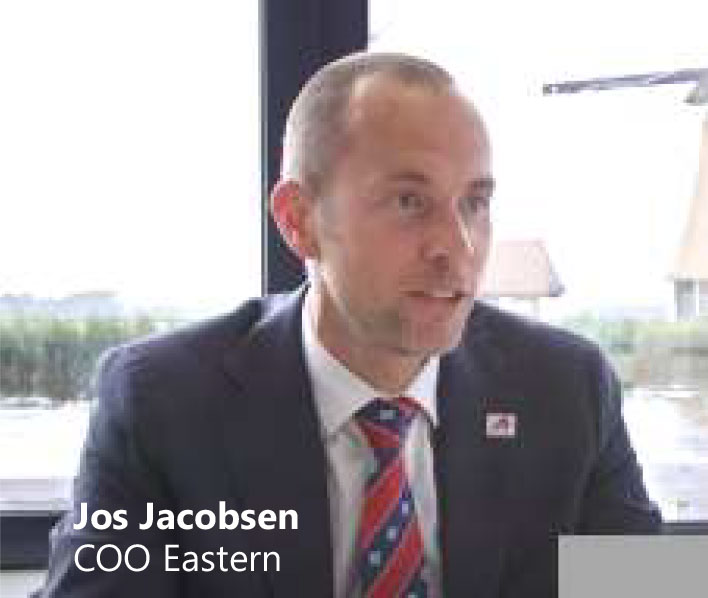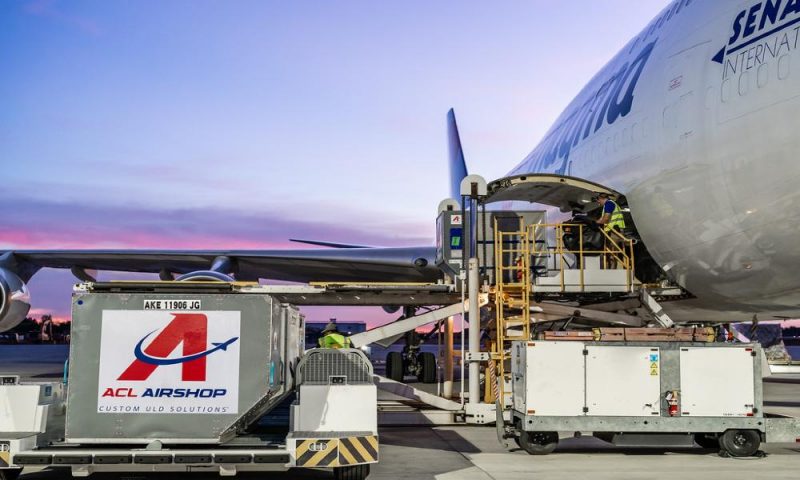ACL Airshop: Leading global ULD business in embracing sustainability
The technology-enabled global leader in customized air cargo ULD solutions, ACL Airshop, has doubled its ULD operations footprint and tripled its lease-ready assets for its more than 200 airlines clients since the pandemic struck.
The South Carolina headquartered company whose products and services include pallets, containers, straps, nets, repairs, and innovative technologies such as “ULD Control” and FindMyULD now has over 70,000 ULDs from only 24,000 five years ago.
Its service sites have also grown to 55 of the world’s Top 100 air cargo hub airports. The company manufactures, sells, leases, repairs, and provides logistics & technology management services for customers’ cargo control assets.
Indeed, business has been blissful for ACL Airshop after suffering initial setback when the Coronavirus outbreak began. But with this much ULDs and a significant number of straps and nets at its disposal, the company also seriously takes its role in properly disposing its cargo products while promoting sustainability in the industry.
 Sustainability is “everybody’s business”
Sustainability is “everybody’s business”
Steve Townes, CEO of ACL Airshop, explains sustainability is now “everybody’s business” and that the company has taken many initiatives years ago to tackle this issue.
“At the IATA World Cargo Symposium in 2021 in Dublin, ACL Airshop was a leading onstage voice for sustainability issues and initiatives in the air cargo industry. The company will once again take on the same thought-leadership role in London for the September 2022 IATA annual symposium. Sustainability has now become “everybody’s business.” For our part, we already use thinner lightweight but FAA-approved pallets wherever feasible, and that reduces fuel burn for our clients,” said Townes, a well-respected serial entrepreneur who earned his engineering degree from the prestigious US Military Academy West Point.
ACL Airshop has also taken steps to reduce waste and energy consumption at its manufacturing and repair stations.
“Even in our own manufacturing and repair operations, we have undertaken Lean Initiatives to reduce waste and energy consumption. For example, we invested in new Dye Ranges in our cargo straps production lines, which eliminated over 12% of excess energy usage and allows us to produce more units with the same strength and quality, with that much less raw material. Across any company’s operations, a lean mindset and a deliberate focus on sustainability will cause new ideas and newfound efficiencies to be discovered,” Townes noted.
Adding, “Much of this comes down to “How does a company operate?” Has sustainability become a top-of-mind awareness topic in the management and the workforce? At a recent ULD Care online symposium, ACL Airshop (with ACL’s Jos Jacobsen as a Board member with ULD Care), made key points about ULDs and Sustainability, citing ways that equipment providers like ACL can help airlines’ goals in this regard with: Reduction in emissions, Improved efficiency, Improved image, more reliable Safety, and Recyclability. Small initiatives such as going paperless, using collapsible ULDs, mandating fuel-efficient autos and trucks in all company operations, making ULDs with recyclable materials, minimizing the use of one-time plastics for cargo sheathing on planes, ensuring that aged ULDs are recycled and re-purposed, using repairs to extend the useful life of pallets and containers—it all adds up.”
Townes, with inputs from Jos Jacobsen, COO & Managing Director-Global Leasing, and Wes Tucker, COO – The Americas & Manufacturing, explains, “Of the many thousands of ULDs that ACL Airshop owns, the predominant pallets are “PMC” and heavy-duty models—why? Roughly 70% of all air cargo flies palletized on freighters; hence, the Company decided decades ago to match its asset investments to that.”
And among the independent ULD management companies, “ACL Airshop is definitely the “kings of pallets.”
“On containers and specialized ULDs, the company’s predominant containers are LD-3, plus various specialty types such as Horse Stalls, stackable Car Racks, collapsible containers, and cool-chain temperature controlling ULDs with partners such as Sonoco Thermosafe,” said Townes.
And when these pallets and other metallic materials have reached their end-of-life cycle in the industry, they are not just thrown out. They are either recycled, reused or repurposed, to help the solve the planet’s growing environmental problems.
“Pallets and other metallic materials can be extended in their useful life cycle by performing regular maintenance and repairs in FAA and EASA certified repair station shops. If they reach the point of “beyond economic repair” or present any type of unsolvable safety issue, they can be repurposed into a variety of other uses that require aluminum,” said Townes.
 “Cargo nets and straps can be repaired so long as they do not exceed their FAA-approved expiration date, or their damages do not exceed official standards for repairability. Once straps and nets reach the end-of-life for air cargo purposes, they can go to recyclers who typically reduce the materials to pellets, which then go into the manufacture of various non-aviation industrial products,” he added.
“Cargo nets and straps can be repaired so long as they do not exceed their FAA-approved expiration date, or their damages do not exceed official standards for repairability. Once straps and nets reach the end-of-life for air cargo purposes, they can go to recyclers who typically reduce the materials to pellets, which then go into the manufacture of various non-aviation industrial products,” he added.
Stronger together in facing adversity
Despite the abrupt negative impact on their business during the initial phase of the pandemic, ACL Airshop didn’t cut its workforce, enabling their employees to sustain their families during what was described as the darkest period in mankind’s modern history.
And what was once perceived as a disastrous moment, the pandemic became a boon for the air cargo industry which was tasked to quickly deliver vital medical supplies, including the COVID-19 vaccines and other necessities.
By 2021, ACL Airshop’s resilience, persistence and commitment in the industry was greatly rewarded, with the upward trends resulting to the company’s best revenue performance in its 39-year history.
“ACL Airshop reacted swiftly and safely to remain in full operation during the pandemic. When it first began in 2020, our volume of business faltered just like the whole air cargo industry, but we did not over-react. It might have been tempting to release staff and slash costs, but instead we held firm and just “tapped the brakes” a bit, taking a calculated risk,” Townes recalled.
“As the resurgent freighter operations and even preighters began taking to the skies again, we accelerated with all our customers, maintained full employment, and steady production of products and services. We closed that year in solid condition. In 2021, the upward trends continued for ACL Airshop, it finished as the strongest year of operations in the company’s 39-year history,” he added.
With ULD business at an all-time high to help countries fight the menacing virus, ACL Airshop doubled its efforts to deliver what was needed in safely storing medical supplies and the vaccines. The company even invested millions more to demand growing demand for its products and services.
“The people of ACL Airshop showed admirable resourcefulness in fighting-through the pandemic, and the unprecedented rising demand for our ULD leasing services and manufactured products. We invested several millions more in growing our own ULD fleets in order to satisfy customer demand in every region of our global network,” Townes shared.
“Thankfully, although we had a few cases of COVID among employees, none were seriously grave and all returned to work, and a high percentage of the workforce are vaccinated. ACL Airshop is maintaining a very vigilant approach toward health and safety as pandemic variants keep emerging. We remain focused on speedy responsiveness to clients–everybody across the whole industry has similar challenges, so we are always ready to help meet requirements for extra pallets, containers, and logistics services.”
The company ramped up its production on in-house manufacturing of straps and nets, and nearly doubling its procurement of pallets and other ULDs from its supply chain in North America, Europe, Asia.
“We have found that it’s essential to give advance orders with more lead-time, and in some cases economic incentives to garner preferential delivery and pricing. We are one of the largest independent buyers of ULDs in the market, especially pallets, and we use our buying power to get the best deals we can for our customers. The global price of aluminum in the past 24 months rose to record highs, which affects all of us. So, we have become more creative and aggressive in our commercial practices,” said Townes.
GOING MORE DIGITAL
ACL Airshop was the first in the market to introduce Bluetooth tracking and tracing for ULDs. And now, it has also pioneered in linking the Airway Bill itself to the serial number of the Bluetooth tag and the serial number of the ULD.
“That was the “Holy Grail” for our multi-year technology roadmap, we have gone beyond Beta testing with a major customer—it works. That will give far better end-to-end visibility and efficiency to every shipper and every cargo carrier who uses these new tools,” said Townes.
“That type of data-rich knowledge is no longer just the domain of the giant global integrators. For us, this is a turning point, a major leap forward. The benefits that we hope to give customers include outright cost savings, logistics efficiencies, and better competitive speed. As one client said, “You allowed me to operate more flight loads per weeks with the same number of airplanes.” We feel it is a measurable benefit to “Do more with less”,” he further noted.
ACL Airshop has its operations centers in Amsterdam, Chicago ORD, and Hong Kong as the control nodes for these useful customer resources.
“That gives our customers 24/7 coverage with all of our logistics and technology services, and our readily deployable giant fleet of pallets, containers, straps, and nets. “When the customer needs some extras ‘in a pinch,’ we are the single best call to make in the air cargo industry,” COO Wes Tucker, explains.
As far as the air cargo industry is concerned, what do you think are its biggest challenges and how can these be overcome in your opinion?
Facing the challenges
But while the air cargo industry remains in high demand, business growth has slowed down due to unforeseen events such as the Russian invasion of Ukraine, the global recession, rising inflation, COVID mutations, higher cost of fuel, different conflicts across the world, among other issues.
“IATA says strong cargo demand and passenger recovery could make the global airline industry profitable in 2023, and the best bright spot has been air cargo. Air cargo business is slowing amid global macroeconomic pressures such as inflation, recession fears, continuing Covid variants, and of course the Ukraine War and other threats. 2022 is still shaping up as one of the industry’s strongest years ever with cargo revenues nearly double those before the pandemic, expected to tip towards “over $190 Billion” by year-end,” said Townes.
“Challenges to air freight include delayed factory production due to severe COVID lockdowns in China; the uncertainties and length of the Ukraine war; a worldwide drop in new export orders; shifts in consumer spending toward services as the pandemic abates, thereby softening the surge of e-commerce during COVID; high inflation; and backlogs & short-staffing at airport cargo facilities. The higher cost of aviation fuel combined with the re-routing of cargo planes around Russian air space is proving to be a costly bogey across much of the industry,” he added.
The ACL Airshop CEO said overcoming these challenges will take time and he believes the biggest wild card would be the Russia-Ukraine conflict.
“The biggest wild card is Ukraine and Russia. Some pundits predict economic chaos if the war persists into a long protracted endless conflict. If the war seriously impacts Peak Season 2022, making predictions will become “anybody’s guess.” ACL Airshop management believes that world trade will continue, planes will continue to be the best way to keep critical inventories moving whilst trucks and ships sit idle, and the end of 2022 will see the dawn of a good new year ahead,” he said.
“Having said that, we do have contingency plans “just in case,” but as before, as an enterprise we do not knee-jerk at the slightest flutter, we stay steady then make decisions and act when it’s imperative.”
ACL Airshop is turning 40 in 2023
ACL Airshop will celebrate a new milestone in 2023 with the company marking its 40th anniversary. From its humble beginnings in 1979, mainly shipping horses, it has evolved into a global leader in ULD leasing, ULD sales, ULD repairs, ULD management, cargo nets and straps manufacturing.
Steve Townes, its CEO, who has led the firm to new heights since taking the helm in 2016, shared more insights on the company’s future trajectory in this brief Q&A.
What has changed since Alinda Capital Partners acquired majority shares at the company in 2021?
The new, huge majority shareholder has brought a longer-term infrastructure lens to our business plans, and that has made ACL Airshop better and stronger. They are among the world’s most successful investors in infrastructure, including transportation and logistics. They also have a successful track record of investment in pooled and leased equipment, and experience in backing growth-oriented companies. They are committed to ACL Airshop’s strategy of growing with its customers and share our vision for continued expansion in the coming years. ACL Airshop is the fastest-growing player in its competitive field, with a strongly amplified Brand Promise that customers know and appreciate.
The company will continue to dominate short-term Leasing solutions for ULDs. And invest steadily in growing the network of service hubs, in innovative logistics technologies, and of course in our people. Moreover, we have enjoyed the benefit of the enormous institutional size of our main shareholder, which allowed us in 2021 for example to roughly DOUBLE our internal growth investments above Plan, aimed at keeping pace with our customers’ demand factors. We pivoted, accelerated, and invested heavily. We could not have done that without such a strong institutional shareholder.
Further, we have now accelerated a corollary strategy to our short-term leasing “moat,” now we are also more-focused on selectively building a profitable portfolio of long-term multiyear ULD Management contracts. Long-term contracts require us to invest even more, and to adjust our commercial terms for competitiveness. We have won several such efforts even in the first year with these new institutional resources and strategic guidance. The merits of long-term recurring revenues are obvious, and that allows us to give clients ALL of the technology and logistics services that we have, thereby becoming even better strategic partners for the customer. By adding multi-year ULD fleet management programs to our offerings several years ago, we have grown in new ways with customers who may have started with short-term leasing solutions. Whether for a few weeks or five years, ACL seeks to remain nimble and cost-effective facilitators for its customers’ air cargo missions.
ACL Airshop is over-performing as a new portfolio company of its majority shareholder, and is maintaining its High-Performance Culture and speedy execution skills. We are also investing more in Training programs for our people, including a new Management Development cohort this year of emerging leaders, and sending a few senior executives to the Center for Creative Leadership. So, it’s the same vibrant company that customers have known for decades, but it now has “a bigger gas tank” and a stronger push on the accelerator.
The culture factor cannot be stressed enough: the DNA of ACL Airshop is different from many companies, remarkably positive, action-oriented. We take great care of our people, who in turn give terrific service to our clients. We pride ourselves in answering customers’ requests in minutes or hours, whereas some competitors take days or weeks plus “several committees.” Our new majority shareholder has assisted us greatly, AND recognizes the competitive value of having a superior employment culture.
What’s the latest with ACL’s global expansion quest? How many more locations were added to the company’s portfolio? What’s next for the company?
Five years ago, we announced that we would double the operational footprint of ACL Airshop in less than 5 years. We have done more than that, so far it has grown 20% more than doubling, and more are planned. Our latest quest started in India, two years ago pre-Covid. We scouted for in-country handling partners and wanted to focus on which major airport hubs would be best for our customers.
As we stand today, we plan to announce the first airport in India perhaps even yet this year (2022), with likely expansion to a second major city next year. Delhi and Mumbai are high on our list. More details will be revealed when we make final decisions—delays are due to the challenging array of geopolitical events currently affecting the whole world, along with the seemingly endless variants that keep emerging in the pandemic.
We are also exploring potential acquisitions of complementary companies that operate in what we will call “airport- and airline-centric adjacencies.” We have a small toe-hold in cold chain, we know we need to do more. If you think of ACL Airshop as an equipment-based hybrid solutions company at airports for airlines, it opens the thought aperture as to “what would be a good strategic fit?” We are scouting for deals.
What’s your hope for the air cargo industry given that its role in facilitating global trade and humanitarian efforts is increasing?
Many of our customers are acquiring more cargo freighters, new and used. Planes are being pulled from desert storage for conversions at large modification centers. Manufacturers are planning more dedicated cargo models. These are all leading indicators at the top of the aerospace food chain, we watch those signals closely. We believe that the COVID pandemic has created tectonic shifts in the way we work, travel, and ship goods.
Permanent changes in how goods move around the world’s economies. There now are stronger links happening in the triumvirate of ocean shipping, ground logistics, and air freight—which portends more strategic growth for air cargo in that blended and eventually seamless ecosystem.
We will track closely with our air cargo customers. We will invest in more ULDs to serve their growing fleets. We will invest in more hub locations to serve their expanding route structures. We will invest in efficient technologies to make their cargo operations more efficient for their end-user shippers. And we will keep investing in our own people to ensure that we can quickly and cost-effectively deliver, every day, everywhere.



